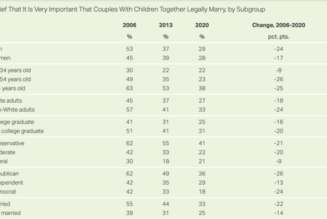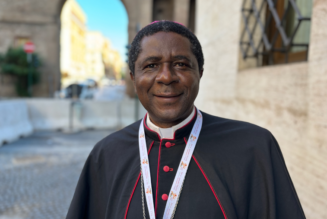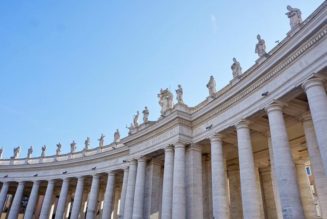By Dr. Jeff Mirus ( bio – articles – email ) | Jan 06, 2022
Yet I will distress Ariel, and there shall be moaning and lamentation…. [Is 29:2]
In Scripture, the word “ariel” means “lion of God”—or it can mean “hero”, as it does in 2 Samuel 23:20, or it can refer to an altar hearth, as it does in Ezekiel 43:15-16. But these meanings seem to be rolled together in the twenty-ninth chapter of Isaiah, where the great prophet calls Jerusalem by the name “Ariel”.
The situation is a common one: The Jews have been unfaithful, and God intends to punish them, to teach them a lesson, so that “Jacob shall no more be ashamed, no more shall his face grow pale. For when he sees his children, the work of my hands, in his midst, they will sanctify my name” (Is 29:23).
But we must remember that a great deal of what we find in the Old Testament, which is true of God’s activity in Israel historically, is also a foreshadowing of Christ and the Church. Moses is a foreshadowing or “type” of Christ; Israel and Jerusalem are foreshadowings or “types” of both the Church and of Heaven itself. This is why we can read many things, especially in the prophets, as referring to the situation of the Church on earth now, even in our own time.
If we look at Isaiah chapter 29 in this way, what do we see?
1. The plight of the Church
First, we see the tremendous shortcomings of the members of the Church on earth, just as we see the shortcomings of the Jews in Jerusalem whom Isaiah himself has more clearly in mind:
And the Lord said: “Because this people draw near with their mouth and honor me with their lips, while their hearts are far from me, and their fear of me is a commandment taught by men, therefore, behold, I will again do wonderful things with this people, with wonder upon wonder; and the wisdom of their wise men shall perish, and the discernment of their discerning men shall be hidden.” [Is 29:13-14]
Here we may take the word “wonderful” in the sense of “astonishing” or “staggering” or even “confounding”, for the next verses accuse “you who hide deep from the Lord your counsel, whose deeds are in the dark, and who say, ‘Who sees us? Who knows us?’ You turn things upside down!” (15-16). Indeed, the prophet demands to know whether the potter should be regarded as the clay, whether the thing made should say of its maker, “He did not make me’, or the thing formed say of him who formed it, “He has no understanding” (16).
Remember, what Isaiah prophesied of those in Jerusalem in his own time is also prophesied of the Church today. How often today do bishops, priests, theologians and Catholic educators substitute falsehoods for Catholic teaching when they conclude that God “has no understanding”! We certainly see all around us in the Church those who “turn things upside down”, those who live by too many words that come from the mouth of the world, the flesh, the devil.
Moreover, anyone who fails to see this sometimes even in himself is a liar: “If we say we have not sinned, we make Him a liar, and His word is not in us” and “He who says ‘I know him’ but disobeys his commandments is a liar” and “If any one says, ‘I love God,’ and hates his brother, he is a liar” (1 Jn 1:10; 2:4; 4:20).
2. The deeper reality
And yet all is not as it seems. The trials of Jerusalem are not only a foreshadowing of the trials of the Church, which is under constant attack from both outside and within, but also a foreshadowing of the trials of Christ Himself, the One who dies yet lives. No wonder Isaiah likens the victory of the enemies of the Jews to a dream. Consider these astonishing verses:
[T]he multitude of the nations that fight against Ariel, all that fight against her and her stronghold and distress her, shall be like a dream, a vision of the night. As when a hungry man dreams, and behold, he is eating, and awakes with his hunger unsatisfied, or as when a thirsty man dreams, and behold, he is drinking, and awakes faint, with his thirst not quenched, so shall the multitude of all the nations be that fight against Mount Zion. [29:7-8]
Indeed, Isaiah proclaims that the Lord who redeemed Abraham has promised it: “Jacob shall no more be ashamed…; they will sanctify my name…. And those who go astray in spirit will come to understanding, and those who murmur will accept instruction” (29:22-24). We need not take this as a universal statement, of course, but it will surely apply to many who go astray unwittingly and many others who, though more guilty, turn again and are forgiven (Mk 4:12; cf. Acts 3:19).
3. Our Church revisited
Our situation in the Church today is just as full of the unseen mystery of Christ as it ever was, and even more filled with the mystery of His Divinity than was the earthly Jerusalem. But the fullness of Christ will be made clear to us only in Heaven: We see now only dimly (1 Cor 13:12) that “the Father has put all things under his feet and has made him the head of all things for the church, which is his body, the fulness of him who fills all in all” (Eph 1:22-3).
We are to strive constantly to make the members of the Church more Christlike, of course, but glory is reserved for the age to come. We are called to share in Christ’s glory in Heaven, but only by sharing in His sufferings now. As St. Paul says, now we are to “complete what is lacking in Christ’s afflictions for the sake of his body, that is, the church” (Col 1:24).
And as Isaiah puts it in the same chapter we have been discussing, the time is coming but it is not now. Or to rephrase this for Christians, this time has begun but is not yet fully realized:
Is it not yet a very little while until Lebanon shall be turned into a fruitful field…? In that day the deaf shall hear the words of a book, and out of their gloom and darkness the eyes of the blind shall see. The meek shall obtain fresh joy in the Lord, and the poor among mankind shall exult in the Holy One of Israel. [Is 29:17-19]
“In that day”, Isaiah insists, the ruthless will come to nothing, the scoffer cease, and all who seek evil will be cut off—those who make the just out to be offenders, who lay snares for those who resist evil, and who “with an empty plea turn aside him who is in the right” (29:20-21). So we must not panic and we must not fracture the body of Christ. The victory of those who devour the Church, whether from outside or inside, is like that of a man who eats heartily in a dream—and wakes up starving to death.
But who among us has never been caught napping? May all of us awaken to our own hunger, strive for food that will last, and join our distress to the sufferings of Christ.
Sound Off! CatholicCulture.org supporters weigh in.
All comments are moderated. To lighten our editing burden, only current donors are allowed to Sound Off. If you are a current donor, log in to see the comment form; otherwise please support our work, and Sound Off!

There are no comments yet for this item.
Join Our Telegram Group : Salvation & Prosperity










